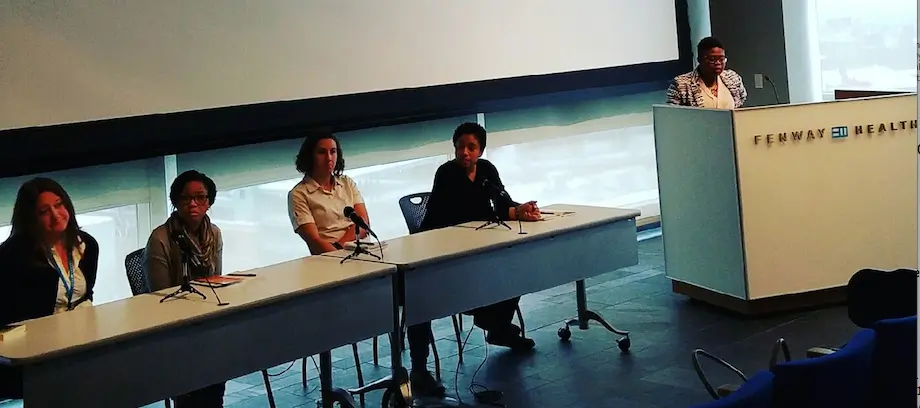On Saturday, February 11, the Fenway Women’s Health Team hosted the event “Our History: HIV and Queer Women of Color” in collaboration with Lesbians of Color Symposium, Boston Black Pride, and The Fenway Institute. The event featured a screening of the film, “Bumming Cigarettes,” a panel of community health advocates, and a presentation by researchers – all of which centered around the voices of queer women of color in sexual health. Through the film, Tiona McClodden, an award-winning black lesbian filmmaker, explores a brief and intimate meeting between a young black lesbian woman in the process of taking an HIV test and a middle-aged black gay HIV-positive man. The panel that followed the film screening included individuals from diverse backgrounds in the HIV and sexual health fields: Iman Berrahou, Researcher and Harvard Medical School Student; Madina Agenor, Assistant Professor of Social and Behavioral Sciences at the Harvard T.H. Chan School of Public Health; Jessica Flaherty, Manager of HIV/AIDS Prevention Programs at The Fenway Institute; and Jennease Hyatt, HIV/AIDS Regional Resource Consultant at the Massachusetts Department of Health and Human Services.
The panelists used the context of the film to discuss the disparities that queer women of color face when accessing sexual health care. Madina pointed out that intersectionality must not only be a theory, but also a practice when centering the experiences of queer women of color and their health. Iman agreed, expressing a need to openly talk about queer sex and include underrepresented communities in clinical staff to combat health disparities. In response to an audience member inquiring about the LGBTQ community’s mistrust of researchers, Jessica encouraged providers to be transparent and connect across roles and identity groups by creating relationships with marginalized communities. Jennease pointed out a need for healthcare providers to reconcile the history of racialized reproductive injustices, as well as bringing queer women of color to the decision-making table about their health.
After the panel, the event featured brunch and presentations by Iman and Madina on their ongoing research about queer women’s health. Madina’s research initiative, Queer Women’s Health Project, explores the sexual health care of young lesbian, bisexual, and queer women in Boston. Iman’s presentation on her current work, the Cervical Cancer Media Project, culminated in a video that addressed disparities in cervical cancer screening rates among sexual and gender minorities by increasing education and awareness. The research presentations in particular and the event as a whole sparked a dialogue among attendees about their sexual health care access and barriers.


